AUG 23- TODAY’S READING FROM THE ONE YEAR BIBLE- JOB 8:1- 11:20; 1 CORINTHIANS 15:1-28; PSALM 38:1-22; PROVERBS 21:28-29
TODAY’S READING FROM THE OLD TESTAMENT- JOB 8:1- 11:20
 Bildad the Shuhite attempts to counsel his friend Job. His words are not very comforting. He accuses Job of being full of hot air! Another negative equivalent would be to say that Job’s defense proved he was a blow-hard- someone who speaks a lot, if not boastfully while communicating nothing meaningful or significant.
Bildad the Shuhite attempts to counsel his friend Job. His words are not very comforting. He accuses Job of being full of hot air! Another negative equivalent would be to say that Job’s defense proved he was a blow-hard- someone who speaks a lot, if not boastfully while communicating nothing meaningful or significant.
Job 8:2 2 “How long will you say these things, And the words of your mouth be a mighty wind?
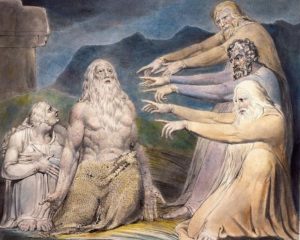 Bildad thinks that to defend God’s justice in dealing with Job, he must accuse Job of unrighteousness. He insinuates that Job must have some secret sin.
Bildad thinks that to defend God’s justice in dealing with Job, he must accuse Job of unrighteousness. He insinuates that Job must have some secret sin.
In defending God’s justice, Bildad presents three arguments.
- God’s character (Job 8:1-7). Bildad knows from history that God has brought judgment upon unrepentant sinners. This fact was evident in the flood. It was evident in the calamity that fell upon Sodom and Gomorrah.
Bildad wrongly applies his fragmented view of God’s character to the trial of Job. Bildad understands that God is just, but he does not grasp other complementary aspects of God’s character. He does not understand His love and mercy or the ministry of God’s grace made possible through the coming work of redemption. He does not understand that God would provide the perfect atonement of Christ’s sacrifice on the cross for those who believe Him.
- The wisdom of the past (Job 8:8-10) Bildad assumes that all the wisdom of the past is on his side, defending the view that God would not allow a person who was sincere in his or her devotion to suffer.
Job 8:8 8 “Please inquire of past generations, and consider the things searched out by their fathers.
The fact that something was said or written in the past does not mean that it is entirely true or applicable to the present moment. The past contains great errors as well as great truths`, and therefore even what has been written by wise individuals should be carefully examined.
 3. The wisdom we can gain from observing nature (Job 8:11-22). Bildad attempts to prove his point with three arguments from nature. First, he believes Job’s suffering is an illustration of the law of cause and effect, just as can be found in plant life. The Papyrus plant flourishes when it is planted in water, but if it does not have water, it withers, fades, and dies. The water is key to the plant’s survival. So Job must not be rightly related to his life source (God) because his life is clearly withering and fading. Bildad gives an additional illustration of a spider’s web that has its function, but it is not strong enough to lean on. Even so, Job’s confidence in his innocence is a fragile argument in Bildad’s eyes. It will not hold up.
3. The wisdom we can gain from observing nature (Job 8:11-22). Bildad attempts to prove his point with three arguments from nature. First, he believes Job’s suffering is an illustration of the law of cause and effect, just as can be found in plant life. The Papyrus plant flourishes when it is planted in water, but if it does not have water, it withers, fades, and dies. The water is key to the plant’s survival. So Job must not be rightly related to his life source (God) because his life is clearly withering and fading. Bildad gives an additional illustration of a spider’s web that has its function, but it is not strong enough to lean on. Even so, Job’s confidence in his innocence is a fragile argument in Bildad’s eyes. It will not hold up.
The third illustration is that of a garden plant’s root system. When it spreads and is anchored properly beneath the ground, the plant does well. But if it is uprooted, it no longer has health. Job must have done something wrong for God to have uprooted him in such a manner and caused him to be in his current tragic state.
Bildad concludes that unless God intervenes to change his circumstances and vindicate him, his condition is a clear indication of his guilt. Bildad encourages Job to repent of his sin to be restored to God’s favor.
Job 8:20 20 “Lo, God will not reject a man of integrity, nor will He support the evildoers.
Bildad’s theology is confined by his limited legalistic mindset.
In Job Chapters 9 and 10, Job asks three questions.
The first is the ultimate question: “How can a man be in the right with God?” (Job 9:2)
The second is rhetorical, “How can I meet God in court?” (Job 9:14, 35)
The third is more ponderous: “Why was I born?” (Job 10:1-22)
 In response to the first two questions, Job is responding to his friends (Job 9). In response to the third question, Job is responding to God (Job 10).
In response to the first two questions, Job is responding to his friends (Job 9). In response to the third question, Job is responding to God (Job 10).
Job’s first question highlights the greatest need of the human being- a right standing before God.
Job 9:2b; But how can a man be in the right before God?
Job tries to understand his situation in the light of God’s justice. In his argument, he uses forensic terminology that brings a courtroom scene to mind.
Notice the words’ dispute’, ‘answer,’ and ‘contend,’ indicating a courtroom case of entering into litigation and having to furnish proof and produce testimony.
Job 9:3 3 “If one wished to dispute with Him, He could not answer Him once in a thousand times.
Job 10:2 2 “I will say to God, ‘Do not condemn me; Let me know why You contend with me.
In the Divine courtroom, Job recognizes his need for mercy from his Judge.
Job 9:15 15 “For though I were right, I could not answer; I would have to implore the mercy of my judge.
Why? Because God’s righteousness is infinitely beyond what we can perceive as human beings.
Job 9:32 32 “For He is not a man as I am that I may answer Him, that we may go to court together.
 The universe is this Judge’s chambers (Job 9:4-11) over which He exercises full sovereign authority.
The universe is this Judge’s chambers (Job 9:4-11) over which He exercises full sovereign authority.
Likewise, in the courtroom, He cannot be manipulated, fooled, or ‘summoned.’
Job 9:19 19 “If it is a matter of power, behold, He is the strong one! And if it is a matter of justice, who can summon Him?
We can see from this passage why the Lord will later commend Job for speaking about Him correctly (Job 42:7).
In verse 33, Job speaks of his need for a Mediator who can lay his hand on both God and sinful man.
Job 9:33 33 “There is no umpire between us, who may lay his hand upon us both.
Jesus fulfills this needed role on our behalf.
1 Timothy 2:5-6 5 For there is one God, and one mediator also between God and men, the man Christ Jesus, 6 who gave Himself as a ransom for all, the testimony given at the proper time.
Job rightly acknowledges that God is His creator and gave him life. But He does not sense that God is treating him as one of his creations. He feels that God is contending with him, oppressing him, and rejecting him, and he does not know why.
He confesses that God must have His reasons, but as a created being, he is feeling clueless.
Job 10:13 13 ‘Yet these things You have concealed in Your heart; I know that this is within You:
Job, at this point, questions why he was ever born.
Job 10:18-19 18 ‘Why then have You brought me out of the womb? Would that I had died and no eye had seen me! 19 ‘I should have been as though I had not been, Carried from womb to tomb.’
Job feels hemmed in by God and searches for deliverance. In fact, God is hemming him in, and He has furnished for Him a Deliverer in Jesus Christ.
There is a reason that Job is being kept in the dark. Job is unwittingly God’s instrument in repudiating Satan’s charge against God.
Job’s defense was not good enough for his friends. Now it is Zophar’s chance to speak.
Zophar is the youngest of the three, and therefore he is the last to speak. He accuses Job of being guilty of sin (11:1-4), ignorant of God (11:5-12), and stubborn in his refusal to repent (Job 11:13- 20). He warns Job of the danger of not admitting his guilt and repenting of his sin.
Job 11:20 20 “But the eyes of the wicked will fail, and there will be no escape for them; And their hope is to breathe their last.”
TODAY’S READING FROM THE NEW TESTAMENT – 1 CORINTHIANS 15:1-28
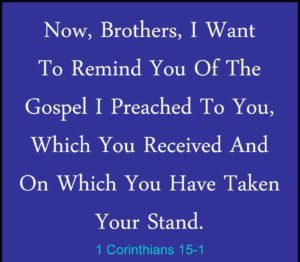 In many ways, Chapter 15 is the jugular vein of Paul’s letter to the Corinthians. He directs his readers to the plain simple truth of the gospel. The gospel is good news. It is not merely good advice. The bad news is that we were hopelessly lost and dead in our sins. The good news is that God, in His great love, came to our rescue. He accomplished the essential work of our redemption by yielding His life as an atonement for sin. Yet what He accomplished in His death would be without any effect if He has not been raised from the dead.
In many ways, Chapter 15 is the jugular vein of Paul’s letter to the Corinthians. He directs his readers to the plain simple truth of the gospel. The gospel is good news. It is not merely good advice. The bad news is that we were hopelessly lost and dead in our sins. The good news is that God, in His great love, came to our rescue. He accomplished the essential work of our redemption by yielding His life as an atonement for sin. Yet what He accomplished in His death would be without any effect if He has not been raised from the dead.
Paul is a classic demonstration of a man who recognizes this.
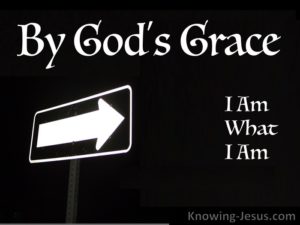 1 Corinthians 15:10a 10 But by the grace of God I am what I am, and his grace to me was not without effect. (NIV).
1 Corinthians 15:10a 10 But by the grace of God I am what I am, and his grace to me was not without effect. (NIV).
Had not Christ been raised, Paul would never have been confronted with the reality of his sin, his debt to the law, his need for salvation, and that this salvation is found in the person of Jesus, crucified, risen and coming again. Had not Jesus been raised from the dead, Paul would not have known of the transforming effect of knowing Christ as His living Savior! Apart from the resurrection, Paul would have been lost to God’s purpose and empty of God’s power.
1 Corinthians 15:10b No, I worked harder than all of them–yet not I, but the grace of God that was with me.
The Corinthian church had many problems. Yet, they could all be solved if they truly understood the implications of Christ’s resurrection. They could be delivered from following the desires of their flesh if they submitted themselves to His Living Lordship and lived in the power of His Indwelling life according to His Word.
1 Corinthians 15:1 1 Now, brothers, I want to remind you of the gospel I preached to you, which you received and on which you have taken your stand.
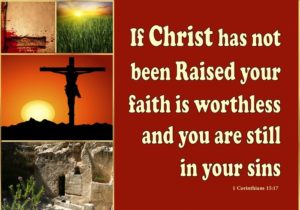 Without qualification, the Apostle Paul declares that the gospel is of first importance. Therefore we must give our attention to preaching it, not just to others, but to ourselves!
Without qualification, the Apostle Paul declares that the gospel is of first importance. Therefore we must give our attention to preaching it, not just to others, but to ourselves!
1 Corinthians 15:3 3 For I delivered to you as of first importance what I also received,
Paul emphasizes that the gospel is about historic facts, without which there would be no hope for the human race. These facts are to be believed. This Christ is to be received on His terms, as He is- the crucified, risen, and returning Lamb of God who takes away the sin of the world and will return as the Righteous King and Judge.
- Jesus died. His was an extraordinary death. It accomplished what no other death could have accomplished. He died as a sinless substitute fulfilling all that the Law required of a perfect atonement. He is the Passover Lamb (1 Cor 5:8; Exodus 12). His death satisfies the justice of God, making it possible for the angel of death to ‘pass over’ and for a holy God to forgive hell-deserving sinners. He fulfills the types of the perfect sacrifice and scapegoat to be offered on the Great Day of Atonement, as described in Leviticus 16. He is the perfect fulfillment of what is typified in the burnt offering, peace offering, fellowship offering, sin offering and trespass offering of Leviticus 1-5. His death is the means of peace being made with God on our behalf.
Isaiah 53:5 5 But He was pierced through for our transgressions, He was crushed for our iniquities; The chastening for our well-being (‘the punishment that brought us peace’ -NIV) fell upon Him, And by His scourging we are healed.
Christ provided the full atonement for our sins. He fulfills all that was declared in the Law and the prophets.
- Jesus was buried. The burial was proof that He died. Although numbered with the transgressors in His death, He was assigned a place of honor in His burial, and the Father did not allow the body of His crucified Son to suffer corruption or decay, as foretold by the Scripture centuries prior to the event (Psalm 16:10).
Psalm 16:10 10 because you will not abandon me to the grave, nor will you let your Holy One see decay.
Isaiah 53:9 9 His grave was assigned with wicked men, yet He was with a rich man in His death, because He had done no violence, nor was there any deceit in His mouth.
- He was raised on the third day. The theological meaning is made known in the Scriptures.
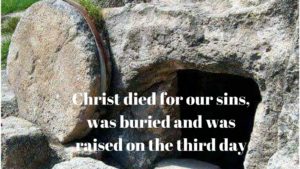 1 Corinthians 15:4 4 and that He was buried, and that He was raised on the third day according to the Scriptures,
1 Corinthians 15:4 4 and that He was buried, and that He was raised on the third day according to the Scriptures,
He rises as the federal head of a new creation. He is raised as the prophets foretold, on the third day, the feast of first fruits, the day after the Passover Sabbath (Leviticus 23:9-14; 1 Corinthians 15:23).
He also gave straightforward predictions of His death and His resurrection on the third day (Mark 8:31; Matthew 17:22; Luke 9:22). The apostles also record Jesus’ more oblique and indirect predictions, which are far less likely to be of human invention (John 2:19; Mark 14:58; Matthew 26:61).
Jesus promised that His death and resurrection would be the sign of Jonah. His resurrection signals to a greater degree, the new beginning on the right course that the release from the belly of the big fish meant for Jonah. His resurrection is a new beginning on the right course for the penitent believers in the stream of humanity!
Matthew 12:40-41 40 for just as JONAH WAS THREE DAYS AND THREE NIGHTS IN THE BELLY OF THE SEA MONSTER, so will the Son of Man be three days and three nights in the heart of the earth. 41 The men of Nineveh will stand up with this generation at the judgment, and will condemn it because they repented at the preaching of Jonah; and behold, something greater than Jonah is here.”
The events of the cross call us all to repentance towards God and faith in the crucified and risen Savior.
The New Testament writers preach how the Old Testament Scriptures predicted the resurrection of the Messiah (Isaiah 53:10-12; Psalm 16:8-11- see Acts 2:25-28; Psalm 22:22- see Hebrews 2:12).
- Jesus appeared. As the burial sealed the reality of His death, so the appearances sealed the reality of His resurrection. His resurrection was not the product of imaginative disciples. It was a surprising jolt to their unbelief. The list of resurrection witnesses is not exhaustive. Paul gives testimony as would be required in a court of law. He lists men. Some of these, like James, the half-brother of Jesus, and Paul (Saul of Tarsus) were known to be unbelievers prior to the resurrection (John 7:5; Acts 8:1; 1 Timothy 1:15; Galatian 1:13; Philippians 3:6).
- Because of the resurrection we have certain hope of victory over sin and death.
But Paul reminds us that the resurrection of Christ, as the firstfruit, is a prototype of the resurrection to come. When the high priest waved the sheaf of first fruits before the Lord on the Feast of First fruits it was a sign that the entire future harvest belonged to Him.
Not only can we be sure that our sins are forgiven, but we can be assured that we will one day be raised bodily to be reunited with Christ and all those who have been brought into His forever family!
Philippians 3:20-21 20 For our citizenship is in heaven, from which also we eagerly wait for a Savior, the Lord Jesus Christ; 21 who will transform the body of our humble state into conformity with the body of His glory, by the exertion of the power that He has even to subject all things to Himself.
As predicted in Daniel, there will be a future resurrection of all people, believers, and unbelievers.
Daniel 12:2 2 “Many of those who sleep in the dust of the ground will awake, these to everlasting life, but the others to disgrace and everlasting contempt.
Jesus rose as the first fruit of the resurrection harvest. The first fruit is a promise of a harvest to come.
The Feast of Pentecost predicts the ingathering of the resurrection harvest.
Jesus spoke of this in John 12:24
John 12:24 24 “Truly, truly, I say to you, unless a grain of wheat falls into the earth and dies, it remains alone; but if it dies, it bears much fruit.”
1 Corinthians 15:20 20 But now Christ has been raised from the dead, the first fruits of those who are asleep.
 Jesus is the prototype resurrected man. At Pentecost, we are united with the resurrected man in glory by the Spirit. One day we will see the Lord in our glorified flesh.
Jesus is the prototype resurrected man. At Pentecost, we are united with the resurrected man in glory by the Spirit. One day we will see the Lord in our glorified flesh.
Job spoke of this.
Job 19:26 26 “Even after my skin is destroyed, yet from my flesh I shall see God.”
In verses 21-22, Paul contrasts the life of Adam with the life of Christ.
The first Adam was made from the earth. The last Adam was the first Adam’s Maker come from heaven to take on flesh in the Incarnation.
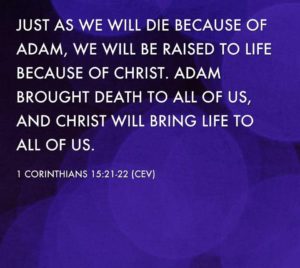 The first Adam disobeyed God and brought sin and death into the world. The last Adam obeyed God and brought righteousness and life into the world.
The first Adam disobeyed God and brought sin and death into the world. The last Adam obeyed God and brought righteousness and life into the world.
Adam and Christ are contrasted also in verses 45-47:
1 Corinthians 15:45-47 45 So also it is written, “The first MAN, Adam, BECAME A LIVING SOUL.” The last Adam became a life-giving spirit. 46 However, the spiritual is not first, but the natural; then the spiritual. 47 The first man is from the earth, earthy; the second man is from heaven.
There is an order of sequence in the future resurrection. We know that the resurrection of believers is separate from the resurrection of unbelievers.
Paul speaks of the rapture and resurrection of believers in 1 Thessalonians 4. John speaks of a separate and later resurrection of unbelievers in Revelation 20.
1 Thessalonians 4:16-17 16 For the Lord Himself will descend from heaven with a shout, with the voice of the archangel and with the trumpet of God, and the dead in Christ will rise first. 17 Then we who are alive and remain will be caught up together with them in the clouds to meet the Lord in the air, and so we shall always be with the Lord.
Revelation 20:4-5 4 Then I saw thrones, and they sat on them, and judgment was given to them. And I saw the souls of those who had been beheaded because of their testimony of Jesus and because of the word of God, and those who had not worshiped the beast or his image, and had not received the mark on their forehead and on their hand; and they came to life and reigned with Christ for a thousand years. 5 The rest of the dead did not come to life until the thousand years were completed. This is the first resurrection.
This order is also confirmed here in 1 Corinthians 15:23-28.
We see history culminating with all rebellion being rooted out and all things put under Christ’s feet so that God will be all in all (1 Corinthians 15:28).
TODAY’S READING FROM THE BOOK OF PSALMS- PSALM 38:1-22
The first penitential song we read was Psalm 6, followed by Psalm 32. Psalm 38 is the third penitential psalm.
Sometimes physical problems can be the result of our disobedience towards God’s commands.
God had chastened David for his sin, and he was feeling it in his body- his flesh, his bones (v.3), his head (v.4), his wounds (v.5), his back (v.6), his loins (v.7), his heart (v.8, 10), his strength (v.10), his nervous system (v. 8), his eyes (v.10), his ears (v.13-14) and his spirit (v.6,8, 10, 17).
 The result of God’s dealing is also isolation from his family and friends (v.11) and persecution from his enemies (v.12).
The result of God’s dealing is also isolation from his family and friends (v.11) and persecution from his enemies (v.12).
But the Psalmist is seeking to respond in a way that honors God.
He confesses his sin and his anxieties (v.18).
He knows that he can expect opposition because he seeks to follow the Lord, and the unbelieving world is opposed to God (v.20).
The Psalm closes with his desperate prayer request:
Psalm 38:21-22 21 Do not forsake me, O LORD; O my God, do not be far from me! 22 Make haste to help me, O Lord, my salvation!
Some have said that desperate prayer is a precursor to revival.
TODAY’S READING FROM THE BOOK OF PROVERBS- PROVERBS 21:28-29
Proverbs 21:28-29 28 A false witness will perish, but the man who listens to the truth will speak forever. 29 A wicked man displays a bold face, but as for the upright, he makes his way sure.
Take heed- False witnesses will ultimately be discredited and destroyed. But the one who listens to the truth will speak forever! This reminds us of Jesus’ words to Pontius Pilate, when He said, “I have come into the world to testify to the truth. Everyone who is of the truth hears my voice.” (John 18:37). And the result is that they will have eternal life that speaks forever!
Verse 29 explains the well-used phrase, “a bold faced lie.” In contrast to the dishonesty of the wicked who put up a false front, those who are truly in the right with God will want to think and act in a way that pleases Him.
PRAY FOR THE NATIONS
Maldives
Republic of Maldives
Asia
Geography
Area: 298 sq. km
1,200 coral islands in 20 administrative groups, 600 km southwest of Sri Lanka in the Indian Ocean. Only 202 islands are inhabited. These have an average size of less than 1 sq. km. Average elevation is one meter.
Population: 313,920 Annual Growth: 1.43%
Capital: Malé
Urbanites: 40.5%
HDI Rank: 95 of 182 (UN Human Development Reports 2009)
Peoples
 Peoples: 10 (50% unreached) All peoples
Peoples: 10 (50% unreached) All peoples
Unreached Peoples Prayer Card
Official language: Dhivehi of Sanskrit origin Languages: 2 All languages
Religion
Largest Religion: Muslim
|
Religion |
|
Pop % |
Ann Gr |
|
534 |
0.17 |
4.0 |
|
|
235 |
0.1 |
4.3 |
|
|
Muslim |
310,906 |
99.04 |
|
Challenges for Prayer
The Maldivians are still among the least evangelized on earth. Neither mission work nor Christian literature has ever been allowed. Paradoxically, the government denies the existence of Christianity among Maldivians while arresting those who do believe. The perception of Christianity is so bad (largely due to Western media and tourist immorality) that political opponents use the term “Christian” to slander one another. Pray for the true name and nature of Jesus to be made known in this nation. Pray that the state’s contradictions and heavy-handedness toward Christianity would generate great curiosity.
Persecution of believers is intense. Any Maldivian practicing Christianity can expect mockery, ostracism, incarceration and even torture. Pray for those who believe – for their protection, their courage in the face of great trials and for opportunities to grow in and spread their faith. On numerous occasions, expatriate believers have been expelled, especially for sharing their faith.
PRAYER: Lord God, You have given us a solid anchor, a certain hope, in the resurrection of Your Son, our Lord, and Savior Jesus Christ. The grave is empty, and our hearts are full as we embrace Him by faith as our Savior. We trust in His merits as we make our plea to come to our aid. We thank You for reminding us of the gospel. Give us a boldness to believe it and proclaim it faithfully. Grant our world a spiritual awakening. In Jesus’ Name. Amen.
